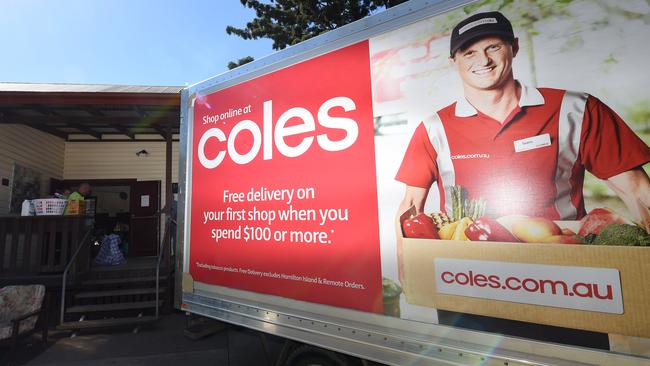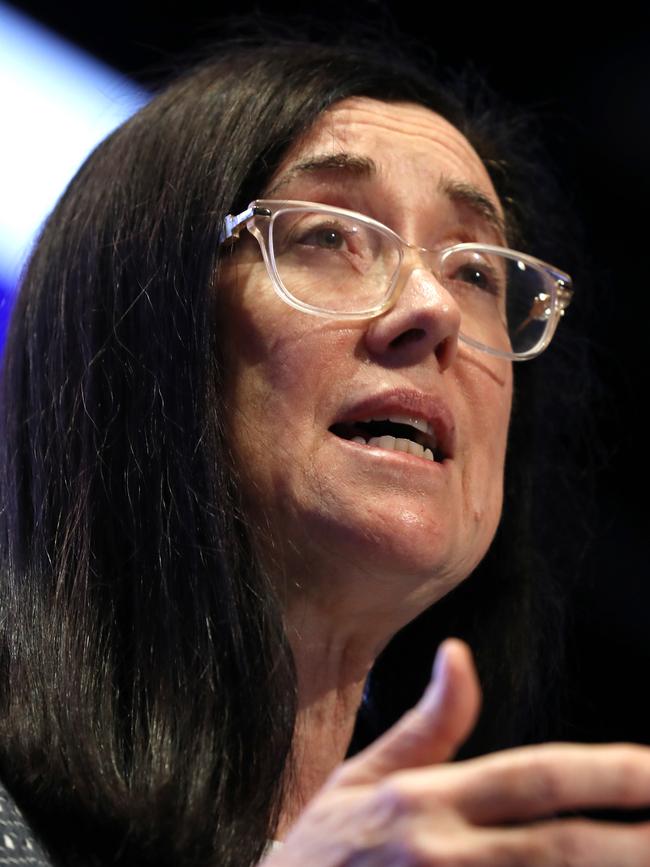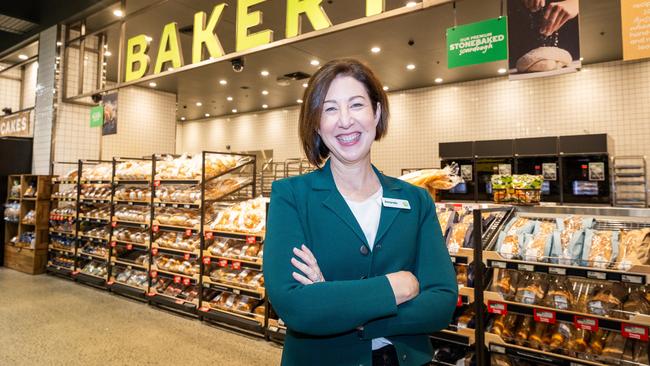Supermarkets Coles, Woolies to test trust with ‘fake discounts’ claims
The ACCC’s claims are as damaging as they can get. But the regulator needs to be careful not to buy into the emotion around price gouging.

Coles boss Leah Weckert has called the competition watchdog’s bluff and is ready to gamble it all on her supermarket’s pricing strategy that she firmly believes was above the law and kept shoppers onside.
It’s a determined move by the new-ish Coles chief executive with the issue of trust around supermarket pricing set to face a legal showdown.
Just as the heat was finally starting to come out of the supermarket sector, Gina Cass-Gottlieb’s ACCC turned the political temperature sky high again.

The ACCC case launched jointly against Coles and Woolies has as much potency as last year’s Qantas “ghost flight” case for misleading on flight bookings, although this one might as well be dubbed “zombie discounting”.
And, like the Qantas case, the alleged activity took place under the watch of former CEOs — Brad Banducci at Woolworths and Steven Cain at Coles. Now its up to new bosses at both to untangle the mess. Already investors are betting there will be a stinging fine for both. Shares in Woolworths and Coles ended down more than 3 per cent. Qantas agreed to pay $120m in a settlement before the case went to court.
The competition regulator’s case is as serious as it can get in an environment where cost of living is the number one political issue. However, the regulator needs to be careful not to buy into the emotion around heated claims of price gouging.
It needs to methodically prove a pattern of supermarket behaviour which was calculated as well as misleading. As Coles points out, this was all happening during February 2022 and May 2023, a period when inflation was running the hottest.
Indeed, for as long as supermarkets have been around, it is common behaviour to see a discount on a product shortly after a shelf price rise. This is designed to ease the sticker shock and keep shoppers returning even at the higher price.
The ACCC alleges behaviour at the supermarkets where prices spiked for a brief period ahead of an item going onto promotion –— with some prices rising as much as 15 per cent.
In some cases the price during the discounting window was higher than the original price leading into the discount. The ACCC’s Cass-Gottlieb describes the discounting promises as “illusory”.

This wasn’t just across one or two items, it was allegedly across hundreds of everyday household items, with the ACCC tracking price behaviour for as long as 12 months.
If the ACCC’s allegations are proven correct, it will only confirm all the worst suspicions around discounting behaviour in retailing.
However with a backdrop of inflation running hot, the case will no doubt turn or what is a “reasonable period” between a new higher regular shelf price for an item and when the same item can go on special.
Given this is a grey area, Coles asked the ACCC for guidance on this very issue in its recent submission to the supermarkets inquiry. Coles has a benchmark of four weeks between a higher price and putting an item on discount. The case will ultimately provide a test of whether this cooling off period on pricing is appropriate.
Coles has declared it intends to defend the allegations and in the process will set itself up with a showdown against the consumer watchdog. Woolworths, whose new chief Amanda Bardwell took over this month, says it is reviewing the claims.
‘Down, down’
Depending on how far the case goes, it also has the potential to shine a light on the opaque world of how discounts are struck and in the relationship with suppliers, who initiated them.
At any one time around 30 per cent of items are on some form of discount or promotion. In most cases supermarkets demand suppliers pay for the bulk of the price cuts. This means the retailer gets double the benefit: margins are protected and (in theory) it enjoys higher volume of sales.

Even though the allegations are aimed at both supermarkets, the case has the potential to be more damaging for Woolworths.
Its reputation has taken a battering as it became the lightening rod for numerous regulatory inquiries. It has been accused of price gouging and handled issues like the Voice referendum and Australia Day badly.
Woolworths too has lost share to its arch rival Coles over the June half-year, prompting a reset with a new everyday low pricing strategy.
Woolies’ Banducci retired last month after more than eight years, with new boss Bardwell barely getting her feet under the desk.
The retailer too is in the middle of a management reset as it looks for a new head of its flagship supermarkets business.
Bardwell said in a statement customers come first and she recognises they want her supermarket to work harder to deliver better value.

Over at Coles, Weckert took charge early last year and since then has worked to win back trust with customers. She’s made the connections with customers, been driving sharper pricing and improved the Coles range. She has also won over critics in Canberra for her strong performance at the parliamentary hearings compared to the poorer performance of Banducci.
It’s significant Weckart has taken a tacitly different approach in preparing to defend her ground from the ACCC’s opening salvo. In an early insight into its defence argument Coles says the issue relates to a period where inflation was at its peak and retail prices — across many items — were rising at the time.
Coles said, in a statement, it “sought to strike an appropriate balance between managing the impact of cost price increases on retail prices and offering value to customers through the recommencement of promotional activity as soon as possible after the establishment of the new non-promotional price”.
Still, both bosses now face a potentially long-running and costly distraction when they least need it. Both know this will shake customers’ faith and there will be a long road to win back trust in discounting strategies.
This represents the worst possible start to a separate investigation by the ACCC into supermarket behaviour, ordered by Treasurer Jim Chalmers earlier this year. That inquiry, while independent from this legal action, was seen as a much-needed release valve for the rising calls for the government to do something around supermarket pricing.
At the same time the legal action was filed, the Albanese Government released a draft of the mandatory food and grocery code of conduct demanding big retailers treat suppliers fairly.
At stake are fines of up to $10m for the supermarkets, including Aldi and Metcash. The code is designed to tackle the relationship with suppliers, but will offer little in terms of pricing. That’s where the ACCC’s legal action kicks in.
All this has already revived calls from the same voices for the big supermarkets to be broken up. Remarkably, this has come from both the Coalition as well as the Greens.
Prime Minister Anthony Albanese last week told the Business Council of Australia annual dinner — which Weckert attended — he had stood up for the retailers in the face of those break-up calls.
The worry is with claims like this ACCC case flying around, surely he’ll think twice about sticking his neck out again.
Originally published as Supermarkets Coles, Woolies to test trust with ‘fake discounts’ claims




